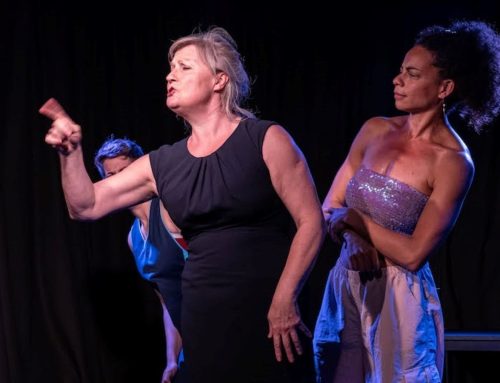Aversion therapy, once used in mid-century Britain to ‘cure homosexuality’, reached its height in the 1950s and 60s. In psychiatric wards, patients were instructed to visualise homoerotic encounters while being dosed with emetics or given mild electric shocks. It is a grim and shameful slice of British medical history, and one that Julian Daye’s F*ggotjacket brings to the stage.
The play centres on an unnamed former soldier-cum-drag-queen recalling his treatment and the disintegration of his sense of self. Daye seems to be striving for a mood of Pinteresque claustrophobia and menace, yet the tension never emerges. Moments of what one supposes is unintentional humour and an opaque blurring of dream-like fantasy and reality without much obvious dramatic direction or logic leave the piece feeling adrift.
“Are you a carrier of diseases?” asks a clipboard-wielding Nurse called Hans (Tom Farrance gets the best of the evening). “No, except for the one I’m here for,” says the Soldier (Julian Daye), who has stripped to his underpants and donned a stained hospital gown. Offstage, an unseen doctor expounds the virtues of the “revolutionary treatment” which involves exorcizing the “demon” of sexual perversion. Framed in the background is the figure of a Woman (Ellie Ricci sings beautifully), “to remind you of the prize,” the doctor says. The ‘therapy’ requires the soldier to fantasise about a tall, handsome, scouser called Stuart, for whom the soldier has a seemingly unfulfilled lust.
Starved of food and water and fed dubious pills, the soldier begins to lose his grip and disassociate into a liminal space between illusion and sanity. The Woman comes to life, first as a hypersexualised, busty waitress singing a bawdy song about wartime sacrifice (Hans has a nifty skill tapping out the tune on a tin bucket), then as the soldier’s cruelly critical mother who tells him “next time you fall you better be dead”.
Hans reappears, initially as the object of the soldier’s sexual desire, but then as a dog, champing at his lead and sniffing at the man’s feet and genitals. Meanwhile, back in what one guesses is the real world, Hans, who may or may not be the Soldier’s alter-ego, is confessing his own dark secret. Then Hans kisses the Soldier and performs a sexual act on him – this may or may not be a fantasy, but is delicately covered by a white shroud.
Daye struggles to find much more to the soldier than a single note of pained, bewildered angst, and a coherent point never emerges from his narrative. Search out Jonathan Harvey’s 2010 play Canary for a much more enlightening treatment of the subject.
Writer: Julian Daye
Director: James Dolan & Molly Owen
New – Online Shop!
My collected theatre reviews now available in paperback format for the years 2022 and 2023.
Just £10 per copy.
Over 100 reviews in each book.
- John Cutler’s Collected Theatre Reviews – Volume One. 2022. Paperback. 296 pages. ISBN 9781805179757. £10
-
John Cutler’s Collected Theatre Reviews – Volume Two. 2023. Paperback. 284 pages. ISBN 9781836884170. £10
Visit my Online Shop or click on Buy Now to order your copies.
More Recent Reviews
The Sea Horse. Golden Goose Theatre.
The Sea Horse, Edward J Moore’s grim slice of mid-century realism, debuted to solid reviews off-Broadway in 1974. Since [...]
Garry Starr: Classic Penguins. Arts Theatre.
Emperor penguins’ shortish treks between sea and nesting sites are about as peripatetic as your average Thameslink commuter. Garry [...]
When the Clarion Came to Call. Cockpit Theatre.
When, upon entering an auditorium, you are told, ‘Take as many pictures as you like, but mind the ceramics,’ [...]







